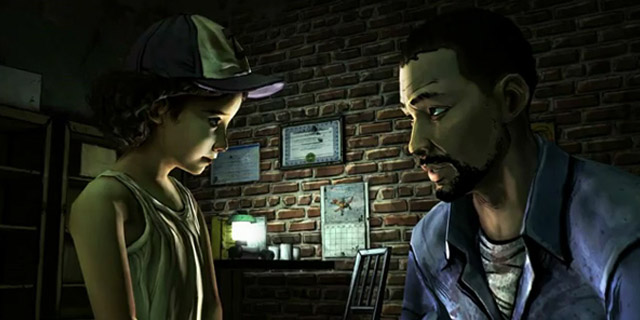
Serotonin’s criteria are simple: did a video game connect with me on an emotional level? Did it make me happy? Sad? Angry? Confused? Bored? Thrilled? As long as I remember it in a meaningful way, it doesn’t matter what the game is. I’ve been pondering lately if the emotional connection is tied to a specific aspect of a game. Am I more moved by musical scores, or do I find peace in gazing upon a particularly beautiful level?
I used to think the ultimate satisfaction came through gameplay. Was I comfortable with the jumping sections? Did the controls help or hinder my progress? How did beating each level make me feel? These are questions I ask myself frequently. It’s a sign of a great game when it connects with me purely through its gameplay. Isn’t that what a video game should be? Games are an experience you control; you are in charge of the progression. You tell your own story, you create your own struggles and triumphs through your own, personal input. Nothing else matters if the gameplay is subpar.
But then came Telltale’s The Walking Dead, and my supposed unshakable foundation of game philosophy was disrupted in a wonderful way.
Here was a throwback to the classic point-and-click adventure games, in which you never felt like you had great control of your character, but you absolutely took ownership of their choices and the story. King’s Quest, Monkey Island, Day of the Tentacle and others were many players’ first venture into something that was completely dominated by story. Gameplay revolved around picking up items, talking to people and trying endless combinations of using item X with item Y (I’ve told you, that doesn’t work).
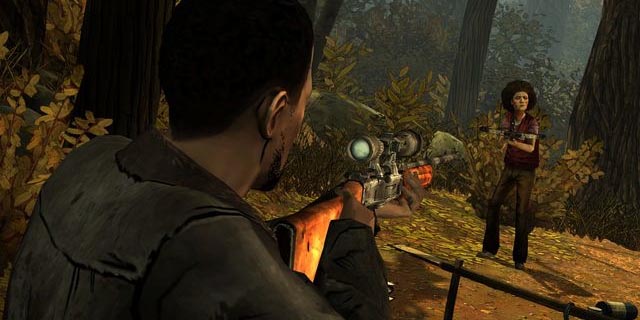
There is virtually no gameplay in The Walking Dead. Instead, I derived my emotional connection through devastating choices in the story, the insane twists that usually followed and voice acting that is on par with most high-budget animated films. So now I come to my conundrum: what provides a greater feelings kick? Gameplay or story? Is one more important than the other for emotional connection? The three best games I’ve played in the last five years are The Walking Dead, Super Mario Galaxy 2 and The Last of Us. It’s no coincidence that they all had a huge impact and have left unforgettable memories with me, but each for different aspects.
The Walking Dead: Season One was gut-wrenching to play through. It wasn’t anything like I’d played before. I knew choices and personalization of story had crept into gaming’s accepted habits since the emerging popularity of titles like Oblivion and Mass Effect, but nothing had hit me this hard from a story aspect in a long time. It’s gotten to the point where I can’t be objective; it’s one of my all-time favorites, and it has nothing to do with the gameplay. Walking around and clicking on cabinets and choosing conversation options don’t exactly challenge me, nor does mashing buttons during a quick-time event. I definitely didn’t need a walkthrough; it’s nearly impossible to get stuck on a particular area. Yet a few scenes resonated with me more than 99 percent of the games I’ve ever played through, and it’s all due to character interactions within the apocalyptic setting.
My jaw painfully dropped when Kenny killed Larry at the farm. The horrifying realization of what kind of food the St. Johns were serving to our group and my frantic rush to run to the dining room to warn Clementine. Dropping Ben to the walkers in the clock tower (I still feel guilty about that one). The ending between Clementine and Lee numbed me like Grave of the Fireflies did; I was completely unable to process that the game was finished. I just sat, mouth agape, and watched the credits roll as “Take Us Back” hurled me into some sense of reality. None of the above scenes were “hard’ to get through. I didn’t have to take down waves of enemies, or solve an intricate puzzle. I was along for the ride, guiding the camera maybe, but certainly playing a more passive role.
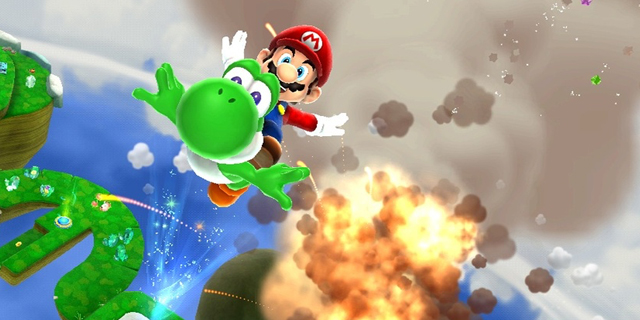
Gameplay didn’t matter in The Walking Dead, but Super Mario Galaxy 2 brought it in spades. It’s unquestionably among the top Wii games, certainly earns its place among classic Mario titles and could be named greatest platformer ever with only a few crying foul. It builds upon the near-perfect Super Mario Galaxy and manages to astonish even the most seasoned veterans of the genre.
I was constantly smiling throughout. The new cloud power-up tested my ability to long jump with timely waggles of the Wii remote to maximize my distance. The challenge of the harder levels forced me to memorize jumps and enemy movements to survive. The world map, replacing the hub world of Super Mario Galaxy, meant I had to waste less time running around and more time getting straight to the action. The controls never let me down. Not once. I relished getting a star at the end of each stage, and yearned to quickly try out a new level to see what other creative obstacles Nintendo had thrown my way.
The grief I felt over The Walking Dead’s heartbreaking storyline was as strong as the joy I felt traversing through the immaculate level design of Super Mario Galaxy 2, and it’s all due to the gameplay. Super Mario Galaxy 2, after all, has little to no story. The princess gets captured by Bowser and Mario talks to some star people; it’s only slightly deeper than the original Super Mario Bros. But, much like how The Walking Dead didn’t need gameplay, Super Mario Galaxy 2 doesn’t need a story. In fact, the game may still be better off without the limited story presented. Playing as Mario is a tradition for many of us. No matter what age we are, or what console it is, or what other games are being released, there will be a Mario game to play. Chances are, it will be an outstanding example of entertainment.
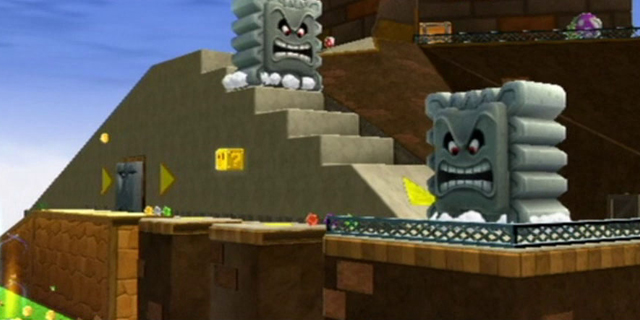
I can’t quite say if one experience was more compelling than the other. I can’t stop thinking about The Walking Dead, but it’s mostly thoughts about how I made the wrong choice or how sad I felt at the end. Season Two has a fantastic scene that places you back (temporarily) in a scene from the first game, and it’s emotionally jarring. It was completely unexpected, and I was nearly moved to tears.
Super Mario Galaxy 2 didn’t quite move me to tears, but my mouth was sore from smiling so much. It, too, had a nostalgic trick up its sleeve by presenting us with the “Throwback Galaxy,” an updated version of Whomp’s Fortress from Super Mario 64, complete with a fantastic, jazzy rendition of the song. It brought me back to when I was in the seventh grade, discovering what a true 3D Mario game could be for the very first time. It made me feel appreciated. Since Nintendo barely touched the level design, I knew exactly where to go and retained the muscle memory to land certain jumps after nearly 17 years.
The Walking Dead had a compelling story. Super Mario Galaxy 2 had stellar gameplay. But neither had both. The best example I can think of recently that combined story and gameplay has to be The Last of Us.
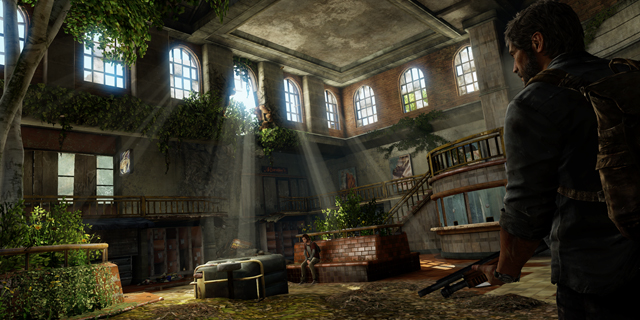
It’s the best example of modern game making, a title that is mature in its pacing and dark in tone, yet hopeful through dialogue and plot choices. The gameplay, in a rare feat, wraps perfectly around the setting and nothing ever feels out of sync. In this world, you are under-powered, malnourished and constantly scavenging for supplies. You look like you haven’t had a decent meal in weeks, and are constantly begging for ammunition for the few guns you find. Not once will the story let you forget who you are, what you’re trying to do and the world you’re trying to survive in.
It’s a combination of stealth, shooting, light puzzles and melee combat that will make you wince with every blow. How many times have I seen with people dying in previous games? Getting beat up? Turning into zombie-like figures? Many, but few retain the power that the The Last of Us has. It not only produces superb cutscenes and movie-like direction, but it tells its story through the gameplay. I truly felt that I was directing Joel and Ellie’s journey with my very own button presses.
Walking through houses and office buildings and pointing the camera at various pieces of furniture made me believe that I was exploring a defunct world. Some of the best storytelling isn’t through the cutscenes and dialogue, but the quieter moments where you’re able to sit back and reflect on what was, and how similar that kitchen table looks to mine. These people were just like me. Instead of slamming into your face, the game shows, rather than tells.
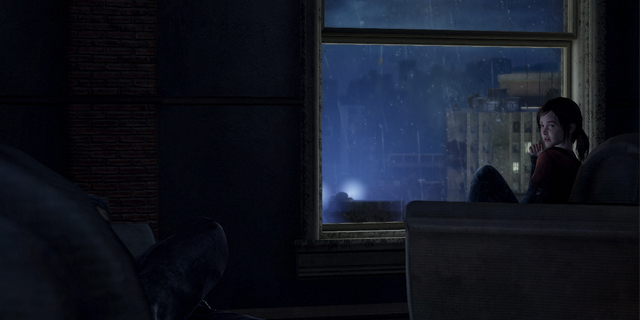
By the time the credits rolled, I was exhausted in the best possible way. I knew I’d played something important, a benchmark that other high quality titles would be compared to for years to come. The controls and challenges gave me satisfaction and told a story through it. Beyond that, the characters felt so real that it was just as cinematic an experience as The Road. The ending sidesteps all clichés and is one of the best I’ve seen in recent memory.
It would be a joyous exercise in futility to try and say which game had the biggest emotional impact on me. Clementine and Lee’s story in The Walking Dead will forever stay with me, but I have no desire to revisit their tale again. I couldn’t care less about how Bowser kidnapped Princess Peach this time, but I certainly have a great desire to revisit Super Mario Galaxy 2’s levels again. The Last of Us has the strength of using its gameplay choices to fuel the story, completing each other without sacrificing either.
I grieved with The Walking Dead. I smiled with Super Mario Galaxy 2. I admired The Last of Us. If a game ever managed to combine the narrative strength of The Walking Dead and the gameplay of Super Mario Galaxy 2, it will be quite a triumph.



















